♻ What is E-Cycle? ♻
Electronic waste or e-waste describes discarded electrical or electronic devices. Used electronics which are destined for refurbishment, reuse, resale, salvage recycling through material recovery, or disposal are also considered e-waste. Informal processing of e-waste in developing countries can lead to adverse human health effects and environmental pollution. Electronic scrap components, such as CPUs, contain potentially harmful materials such as lead, cadmium, beryllium, or brominated flame retardants. Recycling and disposal of e-waste may involve significant risk to health of workers and their communities.♻ Characteristics of E-waste ♻
E-waste stream contains diverse materials, which requires special treatment and cannot be dumped in landfill sites, most prominently, hazardous substances such as lead, polychlorinated biphenyls (PCBs), polybrominated biphenyls (PBBs), mercury, polybrominated diphenyl ethers (PBDEs), brominated flame retardants (BFRs), and valuable substances such as iron, steel, copper, aluminium, gold, silver, platinum, palladium, and plastics. During the last decade, large amounts of diverse e-waste discarded by developing and transition countries, as well as a sizeable portion of the e-waste generated from developed countries and exported to developing and transition countries, has been rapidly piling up in developing countries impacting their emerging economies.The management of e-waste in developing and transition countries is exacerbated by several factors, including illegal trafficking and unlicensed recycling of e-waste; lack of technological, financial, and technically skilled human resources; inadequate organizational structure required; and an inadequate description of the roles and responsibilities of stakeholders and institutions involved in e-waste management.♻ Impact of E-waste ♻
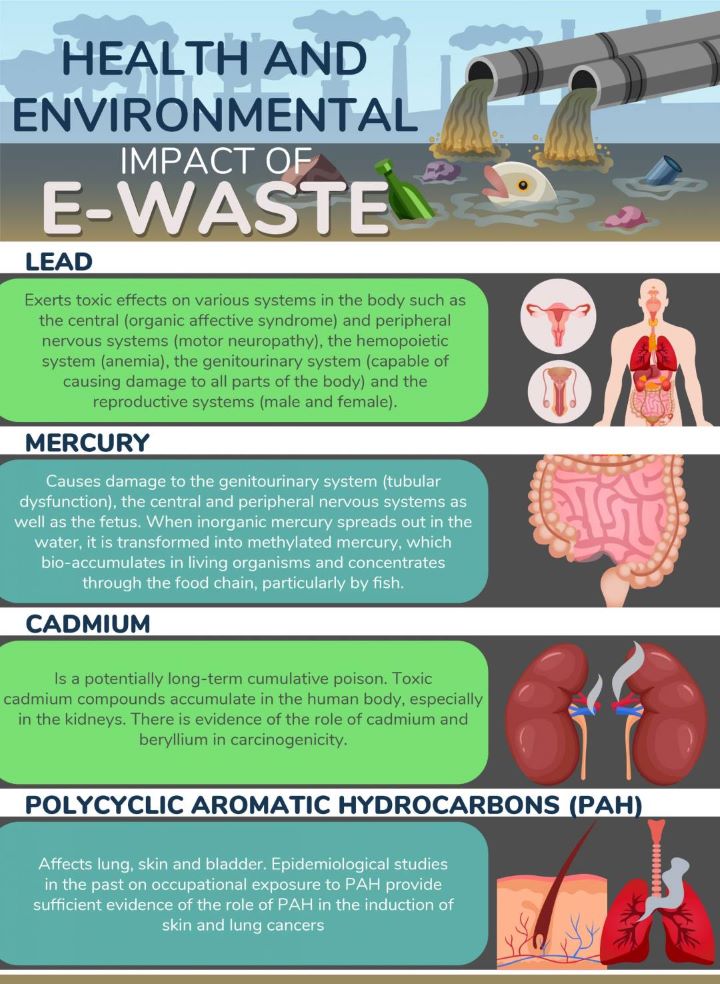
♻ Benefits of E-waste recycling ♻
- 1. Save Landfill Space: Electronic waste is being thrown into landfills at an increasing rate each year. This problem is prevalent not only in the USA, but is quickly spreading around the world. Throwing e-waste into landfills creates many environmental issues. When e-waste is recycled it is not disposed of in a landfill, instead the components of electronic gadgets are separated. Experts determine whether they are reusable or not. Non-recyclable components are disposed of properly so their harmful impact on the environment is reduced and recoverable e-waste components are used to create new products. Keeping e-waste out of landfills reduces the space a landfill occupies, it also means fewer microorganisms and plants are disturbed.
- 2. Save Natural Resources: As per studies, 98% of components in an electronic device are recyclable. Metals extracted through mining require much difficulty and effort. Apart from mining, the cost to refine metals and transform them to a usable form is also very high. Through the extraction and reuse of metal from old electronic gadgets, the need to manufacture and refine raw metals decreases. Wires and other components of electronic devices made of aluminum and copper can be reused multiple times. Reutilizing them in other electronic devices means little to no material goes to waste. Recycling e-waste means that natural resources such as metals aren’t wasted and the energy and cost required to manufacture and mine them are also saved.
- 3. Increase in Employment: There are a lot of jobs in the field of recycling. There are many experts out there that have professional degrees regarding the recycling of electronic waste. Increased education about electronics recycling means more people recycle and more jobs are created. Therefore e-waste recycling industry create more jobs, which mean increase financial stability for our communities.
- 4. Increases Affordability: In many cases, people want to get rid of an electronic device not because it has stopped working, but because they want to buy one with the latest technology. If they give their old gadgets to charity or sell them in a second-hand-shop, other people who cannot afford to buy new electronic devices can easily buy them. Always remember, you may not need an electronic gadget, but it could be of the utmost importance to someone else!
- 5. Removes Data Appropriately: Keeping data safe is becoming an increasingly important issue throughout the world. In most cases, people assume because they have deleted files from their computer, they no longer exist on the computer. But that is not always the case. Permanently removing data from a mobile phone and computer requires special software and proper strategy. Ensuring the appropriate removal of data is mandatory before getting rid of the electronic device. People caught breaking recycling laws or data security regulations face legal implications.
- 6. Saves the Environment: Toxic and harmful poisons are reduced because green gas emissions are decreased and plastic is not thrown into the sea thereby improving marine life. Do not forget, we are a part of the environment, and all the toxic material coming out of the e-waste is harmful to us as well. These toxins from e-waste are partially responsible for diseases such as cancer in human beings as well as animals. Consumers must be responsible and protect the environment by recycling e-waste. To save our future generations from an unhealthy environment or before completely losing natural habitats.
♻ Types of E-Waste ♻
♻ Do you know ♻
A large number of what is labeled as "e-waste" is actually not waste at all, but rather whole electronic equipment or parts that are readily marketable for reuse or can be recycled for materials recovery
Singapore generates about 60,000 tonnes of e-waste a year. That’s equivalent to discarding about 70 mobile phones per person in Singapore!
Singapore is the second-largest generator of e-waste in the region – about 60,000 tonnes of e-waste (equivalent to the weight of 220 Airbus A380 airplanes) was produced each year
When e-waste is warmed up, toxic chemicals are released into the air damaging the atmosphere. The damage to the atmosphere is one of the biggest environmental impacts from e-waste.
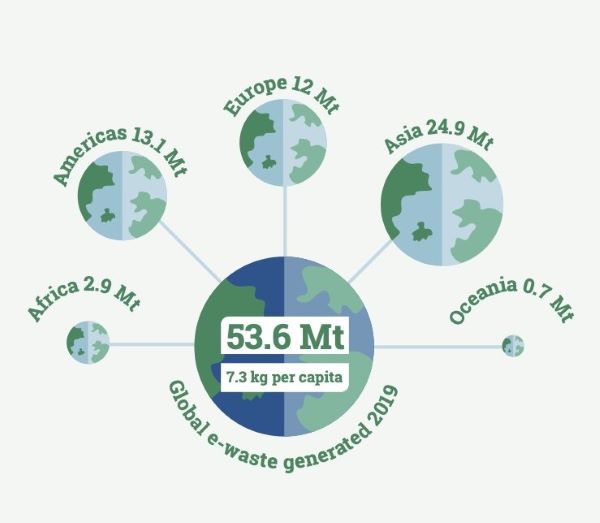
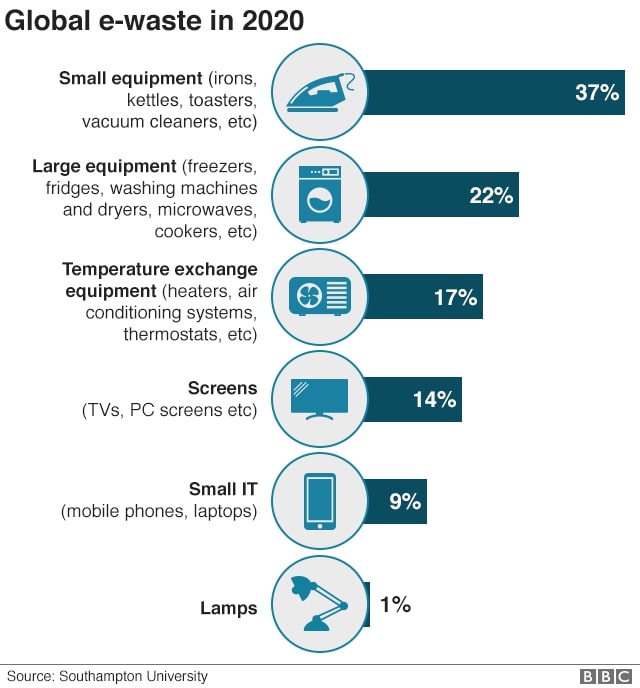
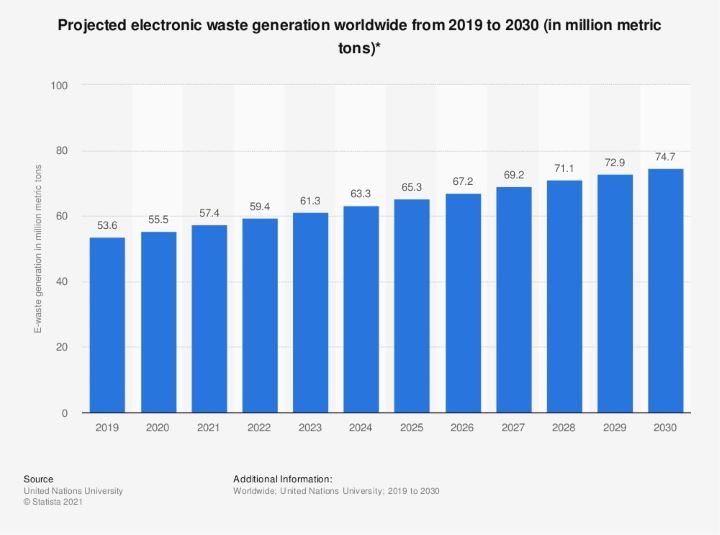
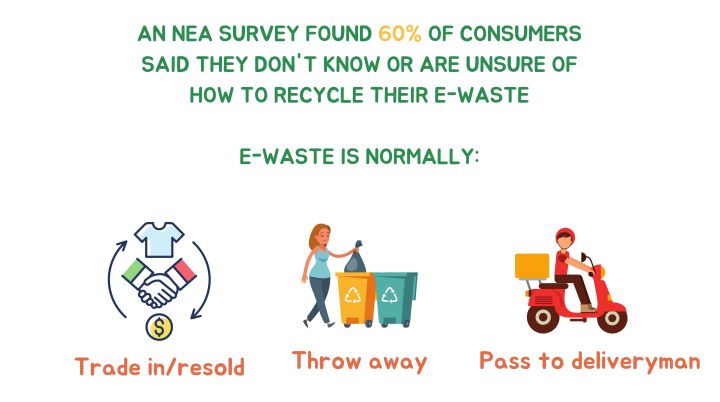
Keeps valuable resources out of the waste of the stream and converses our planet's finite resources.
Ensures harmful substances are not released into the environment
Reduces strain on Singapore's waste disposal facilities and frees up land for letter quality of life for residents
Helps fight climate change, grow our green economy and local employment opportunities